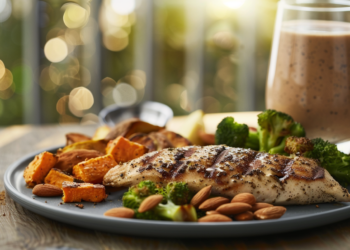To optimize muscle recovery after a workout, prioritize protein intake for muscle repair and growth. Consume protein and carbs within 30 minutes post-exercise for optimal recovery. Hydrate well and maintain electrolyte balance to support performance. Ensure essential amino acids intake for muscle repair. Refuel glycogen stores with complex carbs for energy. Healthy fats aid in muscle recovery, and supplements like creatine and BCAAs can enhance growth. Adequate rest and sleep are crucial for muscle repair. Plan meals with balanced macros to replenish energy. Implement these tips for effective muscle recovery and improved performance.
Key Takeaways
- Consume protein and carbs post-workout for muscle repair and energy.
- Stay hydrated for nutrient transport and joint health.
- Include essential amino acids for muscle recovery and growth.
- Opt for complex carbs to replenish glycogen stores.
- Prioritize quality sleep and rest days for optimal recovery.
Importance of Protein Intake
Ensuring an adequate protein intake is crucial for muscle recovery and growth in bodybuilding. Protein serves as the building blocks for muscle tissue, aiding in the repair and synthesis of muscle fibers damaged during intense workouts. When we engage in resistance training or bodybuilding exercises, small tears occur in our muscle fibers, and it's during the recovery process that muscle growth happens. Protein synthesis is the biological process where cells build new proteins, and in the context of bodybuilding, this means repairing and building muscle tissue.
Studies have shown that consuming an adequate amount of protein post-workout can enhance muscle protein synthesis, leading to improved muscle recovery and growth. It's generally recommended that bodybuilders consume around 1.2 to 2.0 grams of protein per kilogram of body weight daily to support muscle maintenance and growth. Including high-quality protein sources like lean meats, poultry, fish, eggs, dairy, and plant-based sources such as legumes and tofu in our diet can help us meet our protein needs for optimal muscle recovery and growth.
Timing of Nutrient Consumption
For optimal muscle recovery and growth in bodybuilding, the timing of nutrient consumption plays a crucial role in supporting our training efforts. Consuming nutrients at the right time can enhance nutrient absorption and aid in muscle repair. After a workout, our muscles are in a state where they're primed to absorb nutrients efficiently. This window of opportunity, often referred to as the anabolic window, typically lasts around 30 minutes to an hour post-exercise. During this time, consuming a meal or a shake rich in protein and carbohydrates can help kickstart the recovery process by providing the necessary building blocks for muscle repair and replenishing depleted energy stores.
In addition to post-workout nutrition, it's also important to consider nutrient timing throughout the day. Spreading out nutrient intake evenly across meals can help maintain a steady supply of nutrients for muscle recovery and growth. By being mindful of when we consume nutrients, we can optimize our body's ability to repair and build muscle effectively.
Hydration for Recovery

Proper hydration is essential for optimal muscle recovery and performance in bodybuilding. Maintaining adequate fluid levels is crucial for nutrient transport, temperature regulation, and joint lubrication. Dehydration can lead to decreased strength, endurance, and overall workout performance. In addition to water, electrolytes play a vital role in hydration by helping maintain fluid balance within cells and supporting muscle function.
Electrolyte balance is key to preventing muscle cramps, optimizing nerve function, and supporting hydration. Sodium, potassium, magnesium, and calcium are essential electrolytes that can be lost through sweating during intense workouts. Replenishing these electrolytes is crucial for proper muscle recovery and performance.
Hydration strategies should focus on both fluid intake and electrolyte replenishment. Drinking an adequate amount of water throughout the day and during workouts is essential. Adding electrolytes to your water or consuming sports drinks can help maintain electrolyte balance. Monitoring your urine color and body weight can also provide insights into your hydration status. Remember, staying properly hydrated is a simple yet effective way to support muscle recovery and overall bodybuilding performance.
Essential Amino Acids
Maintaining a balanced intake of essential amino acids is crucial for supporting muscle recovery and growth in bodybuilding. Amino acids are the building blocks of protein, playing a vital role in protein synthesis, which is essential for muscle repair and growth after intense workouts. Essential amino acids can't be produced by the body, so it's imperative to obtain them through dietary sources like meat, dairy, eggs, and plant-based sources such as quinoa and soy.
Amino acid synthesis is a complex process that involves various biochemical pathways in the body. When we consume protein-rich foods, our bodies break down the proteins into amino acids, which are then used to repair and build muscle tissues. These amino acids also help in the synthesis of new proteins, aiding in workout recovery and muscle growth.
Incorporating foods rich in essential amino acids into your diet can optimize muscle recovery and support muscle growth, ensuring that your body has an adequate supply of these crucial nutrients for optimal performance.
Role of Carbohydrates

In our bodybuilding nutrition regimen, carbohydrates play a crucial role in fueling our workouts and aiding in muscle recovery. Carbohydrates are essential for providing the energy needed to perform intense exercises and support the recovery process post-workout.
Carb cycling, a nutritional strategy that involves alternating carbohydrate intake levels based on training demands, can optimize performance and promote muscle growth. By strategically timing carbohydrate consumption around workouts, we can ensure that glycogen stores are adequately replenished, enhancing our ability to train at high intensities and recover effectively.
Glycogen replenishment is particularly important after intense weightlifting sessions or endurance training, as these activities deplete glycogen stores in our muscles. Consuming carbohydrates post-workout helps restore glycogen levels, reducing muscle breakdown and supporting protein synthesis for muscle repair and growth.
It's crucial to choose complex carbohydrates like whole grains, fruits, and vegetables to sustain energy levels and provide essential nutrients for overall health. By incorporating carbohydrates into our diet strategically, we can optimize our bodybuilding performance and enhance muscle recovery.
Healthy Fats for Repair
Including sources of healthy fats in our diet is essential for supporting muscle repair and recovery in bodybuilding nutrition. Healthy fats play a crucial role in providing energy, aiding in the absorption of fat-soluble vitamins, and reducing inflammation, all of which are vital for optimal muscle repair and growth.
Some benefits of incorporating Omega-3 fatty acids into our diet include reducing muscle soreness, decreasing inflammation, and improving nutrient partitioning within the body. Omega-3s can be found in fatty fish like salmon, chia seeds, and walnuts.
Lipids are another essential component for muscle repair. Including sources of healthy fats such as avocados, olive oil, and flaxseeds can help enhance nutrient absorption and support the repair process post-exercise. These fats also play a role in hormone production, which is crucial for muscle recovery and growth. By incorporating a variety of healthy fats into our diet, we can promote optimal muscle repair and overall performance in bodybuilding.
Micronutrients for Healing

To further support muscle repair and recovery in bodybuilding nutrition, we now shift our focus to the importance of incorporating micronutrients for healing. Micronutrients play a crucial role in supporting the body's immune system and promoting overall health, which are vital for optimal recovery post-workout.
Ensuring an adequate intake of vitamins and minerals is essential for immune support, as intense exercise can temporarily weaken the immune system. Key micronutrients such as vitamin C, vitamin D, zinc, and magnesium are known to play vital roles in supporting immune function and aiding in the recovery process.
Additionally, micronutrients rich in antioxidants are important for combating oxidative stress caused by intense physical activity. Antioxidants help reduce inflammation, prevent cellular damage, and promote faster recovery. Including foods high in antioxidants like berries, leafy greens, nuts, and seeds can aid in muscle repair and reduce muscle soreness post-exercise.
Incorporating a variety of micronutrient-rich foods into your diet can help support your body's healing process, enhance recovery, and optimize muscle growth in bodybuilding.
Post-Workout Supplements
Let's delve into the significance of incorporating post-workout supplements for maximizing muscle recovery and growth in bodybuilding. After an intense workout, our bodies need specific nutrients to repair and grow muscles effectively. Here are two key types of post-workout supplements that can aid in this process:
- Recovery Shakes: These shakes typically contain a mix of fast-digesting proteins like whey and carbohydrates. Consuming a recovery shake within 30 minutes of your workout can help kickstart the muscle repair process by providing essential nutrients when your body needs them the most.
- Muscle Growth Supplements: Supplements like creatine, branched-chain amino acids (BCAAs), and glutamine are known for their potential to support muscle growth and recovery. Creatine, for example, can enhance strength and power, while BCAAs help reduce muscle soreness and support protein synthesis.
Incorporating these supplements into your post-workout routine can aid in optimizing muscle recovery and growth, helping you achieve your bodybuilding goals more effectively.
Rest and Sleep Importance

Rest and sleep play crucial roles in the process of muscle recovery and growth in bodybuilding, supporting the body's repair and adaptation mechanisms. Quality sleep is essential for optimal recovery as it's during sleep that important hormones are released, such as growth hormone, which aids in muscle repair and growth. Ensuring adequate sleep quality can enhance overall recovery from intense workouts.
Incorporating rest days into your training routine is equally important. Rest days allow your muscles time to repair and grow stronger. Overtraining can lead to muscle fatigue and increased risk of injury, hindering progress in the long run. By taking scheduled rest days, you give your body the necessary time to recuperate, ultimately improving performance and muscle gains.
Prioritizing both sleep quality and rest days can significantly benefit your bodybuilding journey by promoting better recovery, muscle growth, and overall performance. Remember, recovery is just as crucial as the time you spend in the gym, so make sure to give your body the rest it needs to thrive.
Meal Planning Strategies
Ensuring proper nutrition through strategic meal planning is fundamental for maximizing muscle recovery and growth in bodybuilding. When it comes to meal planning strategies, focusing on macro balance and nutrient timing is crucial for optimizing muscle repair and recovery strategies. Here are some key points to consider:
- Macro Balance: Pay attention to the distribution of protein, carbohydrates, and fats in your meals. Protein is essential for muscle repair, while carbohydrates provide energy for workouts and aid in glycogen replenishment. Healthy fats support hormone production and overall health.
- Nutrient Timing: Timing your meals around your workouts can enhance muscle recovery. Consuming a combination of protein and carbohydrates within 30 minutes to an hour post-exercise can promote muscle protein synthesis and glycogen resynthesis. Pre-workout meals should focus on easily digestible carbohydrates and lean proteins to fuel your training session.
Frequently Asked Questions
Can I Still Build Muscle if I Don't Consume Protein Within the First 30 Minutes After a Workout?
We believe that consuming protein within the first 30 minutes after a workout can positively impact muscle recovery and protein synthesis. While not an absolute requirement, timely protein intake can aid in muscle building and repair.
Is It Better to Consume Whole Foods or Protein Shakes for Muscle Recovery After a Workout?
When it comes to muscle recovery after a workout, we swear by whole foods over protein shakes. Nutritional timing is crucial, and planning our meals with quality protein sources aids in optimal muscle repair.
How Does Dehydration Affect Muscle Recovery and What Are Some Signs to Watch Out For?
Staying hydrated is crucial for muscle recovery. Dehydration can hinder this process, leading to slower progress and increased risk of injury. Signs like dark urine, dizziness, and fatigue indicate dehydration and can impact recovery.
Are There Any Vegetarian Sources of Essential Amino Acids That Can Aid in Muscle Recovery?
Yes, plant-based proteins like quinoa, chia seeds, and soy are great sources of essential amino acids for muscle recovery. Incorporating these into our diet can help us meet our nutritional needs effectively.
Can Consuming Too Many Carbohydrates Hinder Muscle Recovery After a Workout?
Consuming excessive carbohydrates post-workout can potentially hinder muscle recovery by blunting protein synthesis. Balancing carbohydrate timing with protein intake is crucial for optimal muscle repair. Additionally, ensuring proper hydration supports overall recovery and performance.
Conclusion
In conclusion, prioritizing proper nutrition for muscle recovery after workouts is essential for maximizing gains and performance.
Did you know that consuming protein within 30 minutes after exercise can increase muscle protein synthesis by up to 25%? This highlights the critical role of nutrient timing in optimizing recovery and growth.
Remember to fuel your body with the right nutrients, stay hydrated, and get adequate rest to support your fitness goals effectively.













